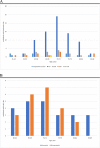Prevalence and modifiable risk factors for dementia in persons with intellectual disabilities
- PMID: 37464412
- PMCID: PMC10354971
- DOI: 10.1186/s13195-023-01270-1
Prevalence and modifiable risk factors for dementia in persons with intellectual disabilities
Abstract
Background: People with intellectual disability (ID) without Down syndrome (DS) are presumed to be at higher risk of developing dementia due to their lower baseline cognitive reserve. We aimed to determine the prevalence of dementia in people with ID without DS and to identify risk factors of dementia.
Methods: This was a cross-sectional survey and multicenter study in Japan. Adults with ID without DS residing in the facilities were included. Caregivers of all participants were interviewed by medical specialists, and participants suspected of having cognitive decline were examined directly. ICD-10 criteria for dementia, DC-LD criteria for dementia, and DSM-5 criteria for neurocognitive disorders were used to diagnose dementia. The severity of ID, educational history, and comorbidities were compared by dividing the groups into those with and without dementia.
Results: A total of 1831 participants were included; 118/1831 (6.44%) were diagnosed with dementia. The prevalence of dementia for each age group was 8.8%, 60-64 years; 9.0%, 65-69 years; 19.6%, 70-74 years; and 19.4%, 75-79 years. Age, severity of ID, duration of education, hypertension, depression, stroke, and traumatic brain injury were significantly associated with the presence of dementia.
Conclusions: Although the prevalence of dementia in people with ID without DS was found to be higher at a younger age than in the general population, the results of this study suggested that adequate education, prevention of head trauma and stroke, and treatments of hypertension and depression may reduce the risk of dementia. These may be potentially important modifiable risk factors for the prevention of dementia in these people.
Keywords: Cognitive impairment; Dementia; Intellectual disability; Prevalence of dementia; Risk factor.
© 2023. The Author(s).
Conflict of interest statement
The authors declare no competing interests.
Figures


References
-
- American Psychiatric Association. Diagnostic and Statistical Manual of Mental Disorders. 5th ed. Washington DC: American Psychiatric Association; 2013.
Publication types
MeSH terms
LinkOut - more resources
Full Text Sources
Medical
Research Materials

